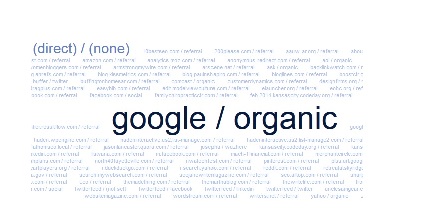Your cart is currently empty!

Content Strategy: Connecting the Dots
One of our clients asked, “Can we separate out the blog traffic?” He’s not so sure, he tells us, that the blog at his website is really important to his online marketing strategy.
There are two questions here. First, is the blog bringing people to his website? For most clients, and indeed for most websites with blogs, the answer is a solid, “Yes.”
Sorting out blog traffic can be a challenge, depending how your site has been built. The first place to try is in Google Analytics, in the Behavior>Site Content>All Pages report. Here are some methods we’ve used:
- Set up URLs for blog posts that include the word “blog.” For a WordPress site, you can do this in Settings> Permalinks. Then just filter for “blog.”
- If your blog posts have dates and your other pages don’t, search with dates or beginnings of dates, such as “201.” This will often pull all and only blog posts.
- Filter out all other pages — this is only practical if you don’t have many non-blog pages, of course.
Once we get the blog traffic sorted out, though, we can usually see that the blog is a significant contributor to the website’s traffic, and often that many of the landing pages are blog pages.
What if it’s not? What if most of the traffic goes to the homepage or to product pages, and the blog is not important for traffic or conversion? Then you need to look at another report.
Check Acquisition>All Traffic. This shows how your visitors find you. You can segment out just the people who convert at your website if you want, and you can also have Google make you a nice word cloud like the one you see at the top of this post. Chances are good that, unless you rely heavily on PPC, your sources cloud will look a lot like ours — Google search (maybe Bing and Yahoo too) and direct traffic are probably your main sources of traffic, and your main sources of converting traffic as well.
If you rely on search for traffic, then your high quality blog is doing some good things for you:
- Giving your website more pages of original content, and thus improving your search rankings
- Increasing the content which is directly relevant to your primary search terms, and thus improving your search rankings
- Adding value for visitors, and thus improving your search rankings
- Allowing you to show up for more search terms, and thus improving your search rankings
- Gaining you larger numbers of natural links, and thus improving your search rankings
Seeing a pattern here? The truth is, your blog makes your website more appealing to search engines, whether it directly brings you traffic or not. That makes it an important, and probably an essential part of your online marketing strategy.
This may also be true of your articles, guest posts at other websites, relationships with influential bloggers who write about your products, and a number of other tactics. If they improve your website’s performance from the point of view of SEO, they may be key to your strategy whether or not they have an obvious place in your customer’s path to purchase.
by
Tags:

Leave a Reply